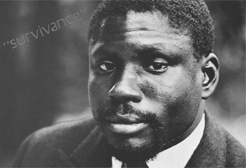|
 Boukaka, Franklin, martyred Congolese singer and composer; born Brazzaville, Oct. 10, 1940; died Brazzaville, Feb. 22, 1972? Boukaka, Franklin, martyred Congolese singer and composer; born Brazzaville, Oct. 10, 1940; died Brazzaville, Feb. 22, 1972?
As the spark of independence erupted from colonialism's dying embers, Boukaka worked both banks of the Congo River in rapid succession. He helped to found Brazzaville's Negro Band in 1958; worked with the Léopoldville (Kinshasa) band Jazz African, members of African Jazz left behind when some of the group went to Brussels in 1960 for the round table conference on independence for Belgian Congo; and joined the first formation of Kinshasa-based Vox Africa.
Back in Brazzaville in 1962 he became a member of Cercul Jazz, a band founded in the fifties in conjunction with the French-sponsored youth organization Cercule Culturel de Bacongo. Boukaka emerged as a leader of the group and developed a substantial following. His "Pont Sur le Congo" (bridge on the Congo) from 1967, suggesting that with the end of colonialism the two Congos should unite, became one of the band's best-known songs.
Boukaka organized an ensemble of sanza (thumb piano) players later in 1967 and performed with them in France under the auspices of the French government. While in Paris Boukaka, singing and playing acoustic guitar accompanied by two sanzas and Jean Serge Essous on sax, recorded several examples of lighter fare including "Les Brazzavilloises," a paean to the women of Brazzaville. The more substantial "Les Immortals" offered an honor roll of martyrs, which he performed with his sanza troupe at the 1969 Pan-African Cultural Festival in Algiers.
Boukaka recorded his finest work in 1970, a twelve-song album arranged by Manu Dibango called Franklin Boukaka à Paris. Spare renditions of Boukaka compositions feature Dibango on piano and sax behind the singer's plaintive baritone. Among the albums's highlights "Le Bûcheron" recounts the suffering of independent Africa in the hands of rapacious politicians. "Les Immortals" repeats the martyr's honor roll with the clear implication that current leaders fail to measure up.
In the early seventies, Boukaka began to transfer his moral outrage from song to action. He joined a group of disaffected Congolese with socialist leanings in a plot to overthrow the government of Congo-Brazzaville president Marien Ngouabi. The attempted revolt of February 22, 1972, ended in failure. Although Boukaka's name appeared on lists of arrested participants, his death was announced a few days later. Many Congolese suspected he had been summarily executed.
In his brief but active career, Boukaka grew from teenaged pop singer to principled social critic. Combining lovely melodies with trenchant lyrics, he critiqued his people's changing lifestyles and goaded the ruling elite in a manner similar to that of Bob Marley and Fela Kuti. His convictions moved him into the dangerous realm of politics cutting short a career that held much promise.
© 2011 Gary Stewart
SELECT DISCOGRAPHY
Franklin Boukaka ses Sanzas et son Orchestre Congolais (Maxi 45, Gilles Sala GS8403) 1967; Franklin Boukaka à Paris (Sonafric CD50048) 1970.
With Cercul Jazz: Les Merveilles du Passé (African LP 360.153) sixties recordings reissued 1986.
SELECT BIBLIOGRAPHY
S. Bemba, 50 ans de musique du Congo-Zaire (Paris, 1984); G. Stewart, Rumba on the River (London and New York, 2000).
|

